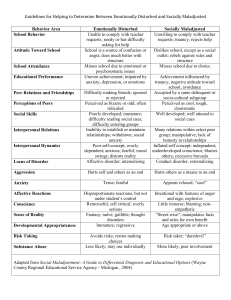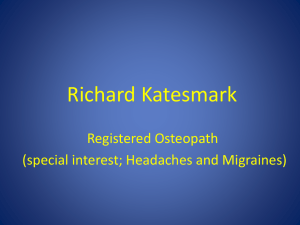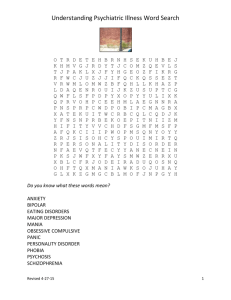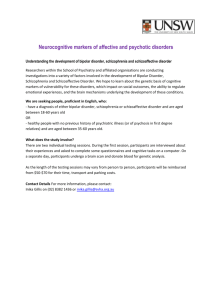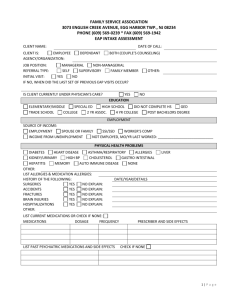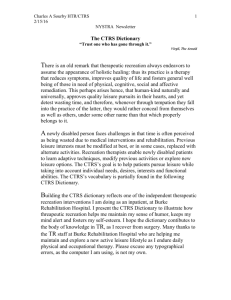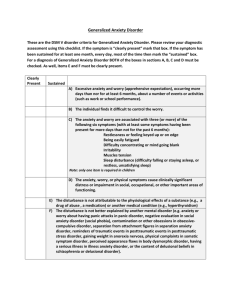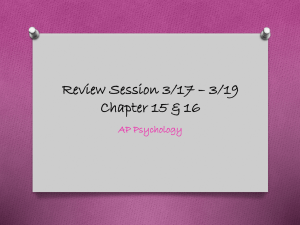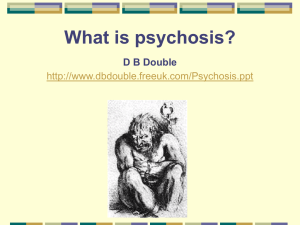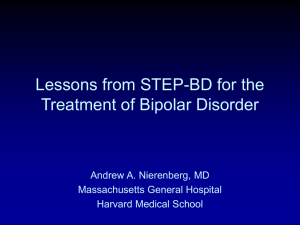Written Plan of Operation
advertisement
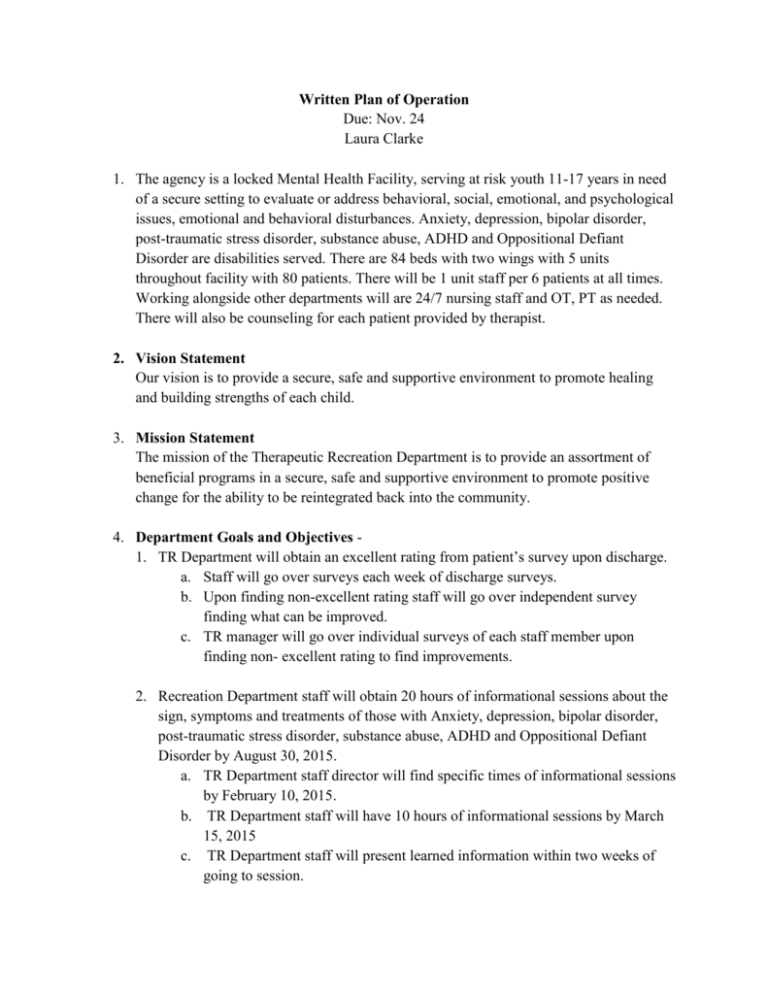
Written Plan of Operation Due: Nov. 24 Laura Clarke 1. The agency is a locked Mental Health Facility, serving at risk youth 11-17 years in need of a secure setting to evaluate or address behavioral, social, emotional, and psychological issues, emotional and behavioral disturbances. Anxiety, depression, bipolar disorder, post-traumatic stress disorder, substance abuse, ADHD and Oppositional Defiant Disorder are disabilities served. There are 84 beds with two wings with 5 units throughout facility with 80 patients. There will be 1 unit staff per 6 patients at all times. Working alongside other departments will are 24/7 nursing staff and OT, PT as needed. There will also be counseling for each patient provided by therapist. 2. Vision Statement Our vision is to provide a secure, safe and supportive environment to promote healing and building strengths of each child. 3. Mission Statement The mission of the Therapeutic Recreation Department is to provide an assortment of beneficial programs in a secure, safe and supportive environment to promote positive change for the ability to be reintegrated back into the community. 4. Department Goals and Objectives 1. TR Department will obtain an excellent rating from patient’s survey upon discharge. a. Staff will go over surveys each week of discharge surveys. b. Upon finding non-excellent rating staff will go over independent survey finding what can be improved. c. TR manager will go over individual surveys of each staff member upon finding non- excellent rating to find improvements. 2. Recreation Department staff will obtain 20 hours of informational sessions about the sign, symptoms and treatments of those with Anxiety, depression, bipolar disorder, post-traumatic stress disorder, substance abuse, ADHD and Oppositional Defiant Disorder by August 30, 2015. a. TR Department staff director will find specific times of informational sessions by February 10, 2015. b. TR Department staff will have 10 hours of informational sessions by March 15, 2015 c. TR Department staff will present learned information within two weeks of going to session. 3. TR department staff will complete progress notes within two days of group program. a. Staff will attend at least one training session on documentation every three months b. Staff will report if not able to complete documentation within two days. c. Staff will be prepared in note taking and be subjective through the process 5. Scope of Care – Using the Leisure Ability Model Psychoeducation groups Goals: 1. Improve anger management 2. Improve social skills This program addresses improving anger management through the use of discussion group while finding positive coping skills. This also is used to improve social skills among peers. Psychoeducation groups occur two mornings per week for 40-60 minutes. Art Therapy Goals: 1. Reduce Stress and Anxiety 2. Provide Leisure Education opportunities This program is for reducing level of stress and anxiety through the use of art. This also is a program that provided leisure education opportunities, through the use of art. Art Therapy occurs three times per week for 40-60 minutes. Co-ed Social Goals: 1. Demonstrating appropriate boundaries 2. Improve positive social skills This program addresses being in a co-ed setting while showing appropriate boundaries with peers. Also the program is used to improve social skills with peers. Co-ed Social occurs three evenings per week for 60 minutes patients will be allowed to go only if they have meet their goals of the week. Community Outings Goals: 1. Improve social skills 2. Community re-integration This program addresses improving social skills within the community. The program is also a positive community re-integration. Also improves knowledge of community resources. Community Outings occur one evening per week for 2 hours Aquatics Goals: 1. Improve physical health 2. Improve social skills This program is used for improving physical health including endurance and muscular improvement. This is also a program for improving appropriate social skills with peers. This program also teaches beginner swimming skills for leisure education. Aquatics program occurs two evenings per week for 40 minutes or according to appropriate weather. Horticulture Therapy Goals: 1. Reduce anxiety and stress 2. Improve social skills This program is for improving social skills with others while working on positive behavior and learning new leisure activities. This program also is used for reducing anxiety and stress through working with sensory stimulation. Horticulture Therapy occurs three times per week for 45 minutes. 6. Disabilities Served Depression – Individuals with Depression may display signs of persistent sad, anxious feelings or feelings of hopelessness or guilt. Depending on severity, symptoms may interfere with ability to work, sleep, study, eat, and enjoy of life. The level of severity will anticipate the level of functioning. Bipolar Disorder – Individuals with Bipolar Disorder display shifts in mood, energy and activity levels. Symptoms can be severe ups and downs through time which are hypomanic episodes and depression, patients can experience both in a mixed state which leads to high agitation, trouble sleeping, changes in eating habits and suicidal thoughts. Depending on severity of bipolar episode determines functioning within program, usual level of participation is average. PTSD – Individuals with PTSD experience all of the following for at least 1 month, at least one re-experiencing symptoms, at least three avoidance symptoms, and at least two hyper arousal symptoms. Children often have symptoms of bedwetting, forgetting how or being unable to talk, acting out, and being unusually clingy with an adult. Depending on activity and displaying symptoms determines level of functioning in programs, but usually proper amount of participation. ADHD – Individuals with ADHD display difficulty staying focused and have trouble controlling behaviors including fidgeting, nonstop talking, and being constantly in motion. Which proper medication and cues individuals with ADHD can be guided through programs with most participation. Oppositional Defiant Disorder – Individuals with ODD regularly have temper tantrums, are argumentative with adults, refuse to comply, blame others for mistakes, and act aggressively. Depending on level of severity of disorder will anticipate the level of functioning. Anxiety – Individuals with Anxiety have extreme, embellished worries about everyday life. The symptoms of those with anxiety can interfere with daily functioning. Most can participate in daily programs but it depends on their level of anxiety. 7. Department Policy and Procedures - Attendance policy - Vacation policy - Late policy - In climate weather - Staff to patient ratio - Volunteer policy - Document disposal - Handle with care - Emergency situation policy - Dress code - Vehicular policy - Pool Safety - Documentation - Insurance policy - Community outings 8. Staffing TR Department will have 4 full time staff. All full time staff will have graduated from college with concentration in Therapeutic Recreation or Recreation, also staff will have to have passed and obtained CTRS certification. The staff also needs 1 year experience in a mental health facility. The TR Department will also have one full time Therapy Director who will have all the same qualifications as a full time staff along with 5 years’ experience in mental health facility. The director will also be in charge of one intern per semester. Also one full time staff will be certified in music therapy or art therapy. There will also be 2 part time staff have to have graduated from college with concentration in Therapeutic Recreation or Recreation, also staff will have to have passed and obtained CTRS certification. No volunteers without extensive background check and week of training, and can only help on weekends with church services. 9. Budget They will be using a Flexible Budgeting for the department. Full time staff will be paid 35,000 yearly or according to years at facility. Therapy Director will be paid 50,000 per year. Medicaid pays for patients, $600 per month of cash for programs and supplies allotting to a7200 per year budget through a Walmart card. The annual budget over all is 232,000 per year. There will be a yearly budget of $600 for marketing which will include price reduction in plane and hotel cost of conference visits. The marketing budget will be used also to make and produce flyers, business cards, and brochures. CTRS, 35,000 + CTRS, 35,000 + CTRS, 35,000 + CTRS, 35,000 + TR Director, 50,000 + 2 Part time, 35,000 + Marketing, 600 Program and Supplies 7,200 . $232,600 10. Program EvaluationFormal surveys on the TR department programs will be given to discharging patients to fill out. The survey will consist of specific programs and rating section of staff. Observational notes will also be used in determining effectiveness of programs that will be written by unit staff and the director weekly. Weekly audits of documentation will also occur to insure that Medicaid will be provided per patient.
